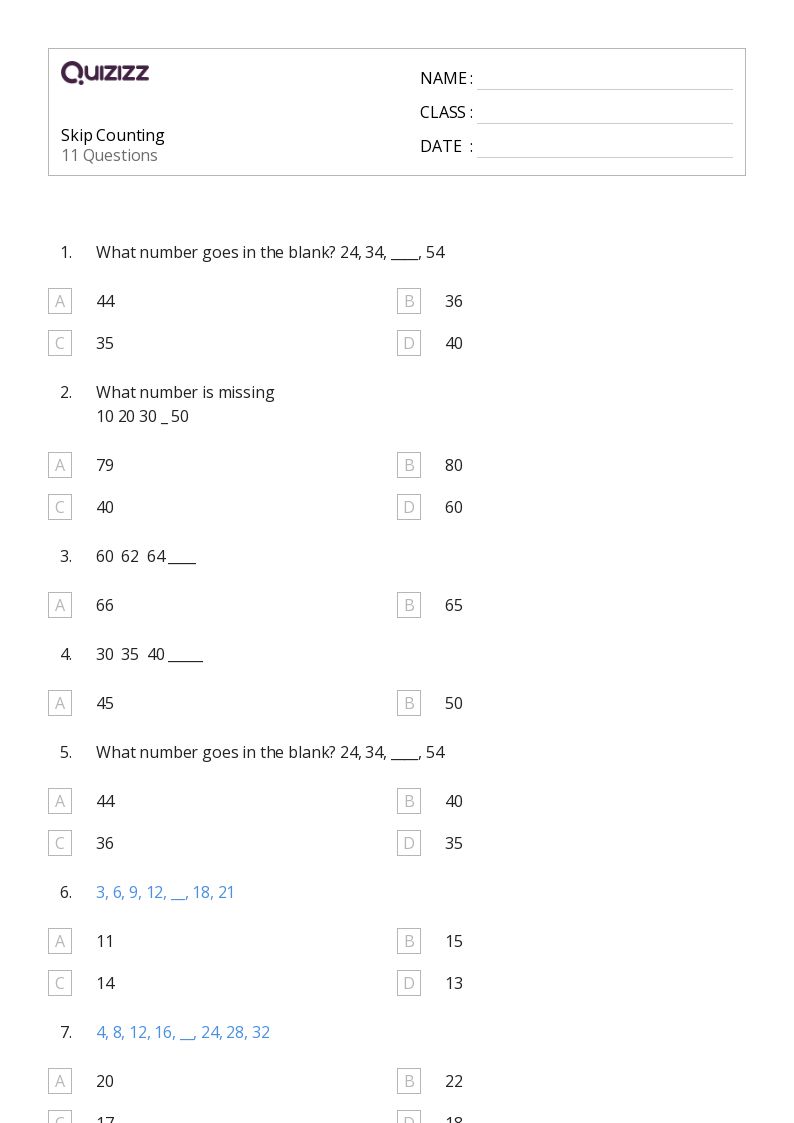Unlocking Number Magic Skip Counting Adventures for First Graders
Imagine a child standing on the edge of a vast numerical ocean, eager to dive in. Numbers shimmer and beckon, but the sheer quantity can feel overwhelming. Skip counting, like a magical stepping stone, offers a way to navigate this ocean with confidence and joy. For a first grader, learning to skip count is a pivotal moment, akin to discovering a secret code that unlocks a deeper understanding of mathematics.
What exactly is this enchanting code? Skip counting, also known as counting by intervals or repeated addition, is simply counting in increments larger than one. Instead of counting 1, 2, 3, 4, a child learning to skip count by twos would count 2, 4, 6, 8. This seemingly simple shift opens doors to a world of mathematical understanding, paving the way for multiplication, division, and a more nuanced grasp of number relationships.
While the precise origins of skip counting are lost to the mists of time, its importance in early mathematical development is undeniable. Ancient civilizations likely used forms of skip counting for trade and measurement, laying the foundation for more complex mathematical systems. Today, it remains a cornerstone of elementary education, providing children with a vital tool for navigating the world of numbers.
One of the main challenges first graders encounter with skip counting is maintaining the correct sequence. The temptation to revert to counting by ones can be strong, especially with larger intervals. However, with practice and engaging activities, children can overcome this hurdle and develop fluency in skip counting various number sequences.
Let's consider a simple example: counting by fives. A child might use their fingers to keep track, counting 5, 10, 15, 20. They might visualize a number line, hopping five spaces at a time. Or they might use a hundred chart, circling the multiples of five and observing the pattern that emerges. Each of these methods offers a different pathway to understanding and mastering skip counting by fives.
Skip counting provides a multitude of benefits for first graders. Firstly, it strengthens number sense by helping children recognize patterns and relationships between numbers. Secondly, it develops fluency in addition, as skip counting is essentially repeated addition. And thirdly, it lays a crucial foundation for multiplication, as multiplication is simply repeated addition of the same number. For example, counting by threes (3, 6, 9, 12) is a precursor to understanding multiplication facts like 3 x 4 = 12.
An effective action plan for teaching skip counting involves using a variety of multi-sensory activities. Start with concrete objects, like buttons or blocks, allowing children to physically group and count them in intervals. Incorporate movement, such as hopping or clapping, to make learning more engaging. Use visual aids like number lines and hundred charts to reinforce the patterns. And finally, connect skip counting to real-world scenarios, such as counting coins or organizing toys.
Advantages and Disadvantages of Skip Counting
| Advantages | Disadvantages |
|---|---|
| Builds a strong foundation for multiplication | Can be challenging for some students to grasp initially |
| Improves number sense and pattern recognition | Requires consistent practice and reinforcement |
| Enhances addition skills | May not be suitable for all learning styles |
Five best practices for implementing skip counting:
1. Start with smaller intervals like twos and fives.
2. Use concrete objects and manipulatives.
3. Incorporate movement and games.
4. Connect skip counting to real-world situations.
5. Provide ample practice and positive reinforcement.
Frequently Asked Questions:
1. What is skip counting? (Counting by intervals greater than one)
2. Why is skip counting important? (Builds foundation for multiplication and strengthens number sense)
3. How can I help my child with skip counting? (Use games, manipulatives, and real-world examples)
4. What are some common challenges with skip counting? (Maintaining the sequence and remembering intervals)
5. How can I make skip counting fun? (Incorporate games, songs, and movement)
6. What resources can I use for skip counting practice? (Online games, worksheets, and manipulatives)
7. How does skip counting relate to multiplication? (Multiplication is repeated addition, which is the basis of skip counting)
8. When should my child start learning skip counting? (First grade is a good time to introduce skip counting concepts)
In conclusion, skip counting is a foundational mathematical skill that empowers first graders to navigate the world of numbers with confidence and understanding. From strengthening number sense and enhancing addition skills to laying the groundwork for multiplication, the benefits of mastering skip counting are numerous. By implementing engaging activities, providing consistent practice, and connecting skip counting to real-world scenarios, educators and parents can help children unlock the magic of numbers and embark on a lifelong journey of mathematical discovery. Embrace the power of skip counting, and watch as your child's mathematical abilities flourish.
Finding solace navigating funeral scripture in the church of england
Craigslist wv southern west virginia
Unleash your inner rockstar lady gagas born this way live














